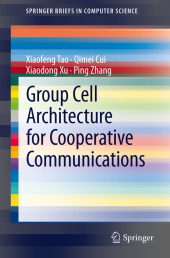 Neuerscheinungen 2012Stand: 2020-01-07 |
Schnellsuche
ISBN/Stichwort/Autor
|
Herderstraße 10
10625 Berlin
Tel.: 030 315 714 16
Fax 030 315 714 14
info@buchspektrum.de |

Qimei Cui, Xiaofeng Tao, Xiaodong Xu
(Beteiligte)
Group Cell Architecture for Cooperative Communications
2012. 2012. xv, 92 S. 58 SW-Abb., 15 Tabellen. 235 mm
Verlag/Jahr: SPRINGER, BERLIN 2012
ISBN: 1-461-44318-0 (1461443180)
Neue ISBN: 978-1-461-44318-6 (9781461443186)
Preis und Lieferzeit: Bitte klicken
Driven by the increasing demand for capacity and Quality of Service in wireless cellular networks and motivated by the distributed antenna system, the authors proposed a cooperative communication architecture-Group Cell architecture, which was initially brought forward in 2001. Years later, Coordinated Multiple-Point Transmission and Reception (CoMP) for LTE-Advanced was put forward in April 2008, as a tool to improve the coverage of cells having high data rates, the cell-edge throughput and/or to increase system throughput. This book mainly focuses on the Group Cell architecture with multi-cell generalized coordination, Contrast Analysis between Group Cell architecture and CoMP, Capacity Analysis, Slide Handover Strategy, Power Allocation schemes of Group Cell architecture to mitigate the inter-cell interference and maximize system capacity and the trial network implementation and performance evaluations of Group Cell architecture.
Introduction to Group Cell Architecture.- Capacity Analysis.- Slide Handover.- Power Allocation of Group Cell System.- Group Cell Trial Systems.
From the reviews:
"Coordinated multi-point (CoMP) is the name of a new communication scheme that allows dynamic coordination among multiple geographically separated transmission points in a wireless communication network. ... In this monograph, the authors claim that the ideas of CoMP were already covered in a 2001 Chinese patent on group cell architecture. ... researchers in the field of coordinated multi-point transmission may find the presented results interesting." (Klaus Galensa, ACM Computing Reviews, October, 2012)


